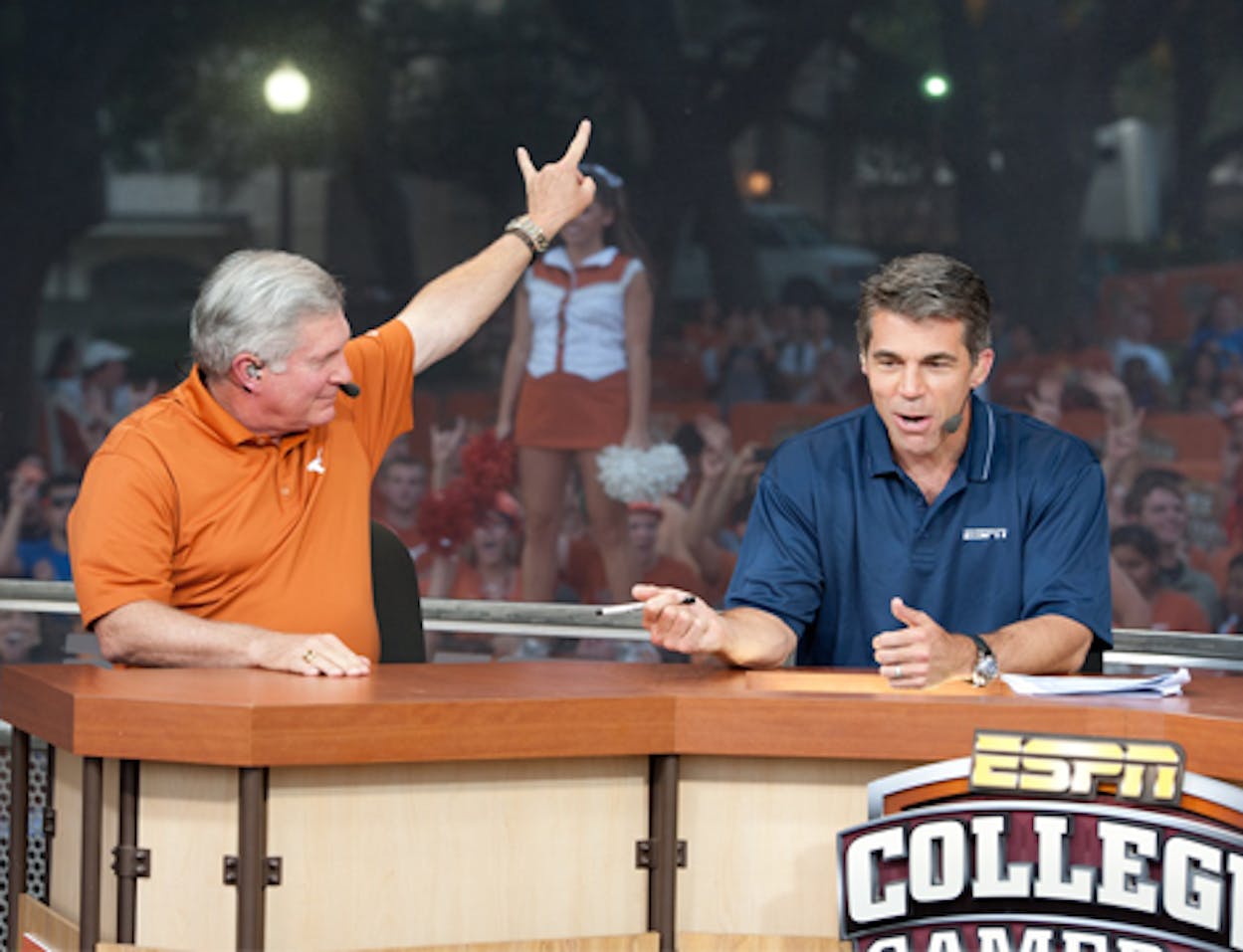The Longhorn Network came to life on August 26 with a stirring introductory montage narrated by the actor Matthew McConaughey. “Ours is the color of the sunset and leather,” the famous University of Texas Ex intoned. Then, a few lines later: “One flag, one star, one state, one school.”
He might as well have added, “We’re Texas—and you’re not!”
Never has a single television channel caused such controversy without reaching any viewers. Long before its first live football broadcast—the Texas-Rice game Saturday night—the Longhorn Network had been blamed for Texas A&M’s leaving the Big 12 Conference and inspired an NCAA moratorium against broadcasting high school football.
The ESPN owned-operated, UT-branded network is the first of its kind in college sports. Previously, there had been only the Big Ten Network and NBC’s contract with Notre Dame. ESPN will pay Texas and its marketing partner, IMG College, an average annual fee of $15 million over the next twenty years, giving fans of every other university 300 million more reasons to hate the Horns.
“I’m not comparing the University of Texas to the Yankees in any way,” said Lowell Galindo, a Longhorn Network anchor. “But that would be a comparison as far as a polarizing team out there.”
Like the Yankees (who started their YES Network in 2002), Manchester United and a certain Texas NFL team, the University of Texas is a global brand. You can’t travel anywhere without seeing at least one dude in a Bevo hat at baggage claim.
“By every metric, they are at the top of the heap,” said Burke Magnus, ESPN’s senior vice president of college sports programming, citing not only UT’s tradition, but also its merchandising revenue, large alumni base, and even the fact that Texas picked up four Congressional seats for 2012.
That the network has initially struggled to get into viewers’ homes (as of Friday, Verizon FiOS was the only national cable or satellite provider offering the network) is merely a short-term impediment. If the Big 12 falls apart, the Longhorn Network makes it easier for UT to go independent; another option might be joining the Pac–12, which has a conference network planned with Fox.
In an age when people spend twenty hours a week listening to sports talk radio, combing message boards or paying monthly fees to read recruiting Web sites, there’s no doubt about fans’ appetite for nonstop coverage—even when that coverage is the sixteenth replay of the 1969 Arkansas game or a ton of women’s volleyball.
The network intends to broadcast at least two hundred live events in twenty sports, a huge boon for those less celebrated teams. And part of the money Texas gets from ESPN will flow directly to academics—reportedly starting with fifty percent of everything the university takes in over the next five years—something that is all too rare in college sports. (In June, USA Today reported that UT’s athletic department was just one of seven programs out of 219 that was not subsidized by student fees or other university money.)
What’s troubling news media critics is that the network makes UT and ESPN basically inseparable. “No matter how ESPN spins it, the Longhorn Network is a P.R. arm of Texas,” wrote Richard Deitsch, a media columnist for SI.com.
But ESPN doesn’t perceive the Longhorn Network to be any different from what it already does with entities like the Bowl Championship Series, the Southeastern Conference, or the NFL.
“Our guys are pros,” Magnus said. “If you take it out one notch in terms of the business spectrum, we have significant business relationships with every conference—college and pro—that are very, very lucrative business arrangements that are completely separate from our journalistic mission.”
It’s a mission ESPN can’t always fulfill. The network’s decision to broadcast LeBron James’s infamous special, “The Decision,” called into question its ability to cover that Miami Heat star. Closer to home, ESPN has myriad conflicts of interest involving Mike Leach, the fired Texas Tech head coach, as it has employed both the broadcaster Craig James, the father of a player Leach allegedly mistreated, and the writer Bruce Feldman, the co-author of Leach’s autobiography. (Feldman left the network Thursday.)
ESPN’s checkbook doesn’t buy autonomy from UT either. As the Austin American-Statesman reported in May, the Longhorn Network contract says it will replace any on-air talent that UT determines “does not reflect the quality and reputation desired by UT for the Network based on inappropriate statements made or actions taken.” That would certainly require something more severe than second-guessing play calls, but the clause is still extraordinary.
The Longhorn Network’s anchors and reporters know it does not do them any good to be in the public relations business.
“We’re all journalists first and foremost,” Galindo said. “We have to be honest. Because if there’s a loss this season, and Texas doesn’t play well, if I come on to the Mack Brown coach’s show and I talk to him and it’s everything’s peachy and rosy, then I’m not doing a service to anybody. Because as someone that grew up following this program, I don’t want to watch that!”
But then, as someone who grew up following the program, Galindo also named one of his kids after Brown.
Which makes the Longhorn Network the most honest entity in college sports. One flag, one star, one state, one school, one television network.








